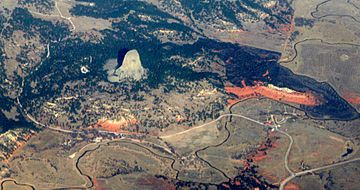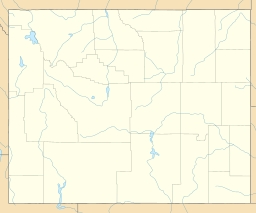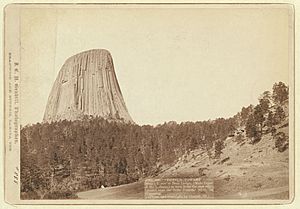Bear Lodge Mountains facts for kids
Quick facts for kids Bear Lodge Mountains |
|
|---|---|

Devils Tower National Monument, a popular attraction in the Bear Lodge Mountains
|
|
| Highest point | |
| Peak | Bear Lodge Mountain, also known as Warren Peak |
| Elevation | 2,024 m (6,640 ft) at the Bear Lodge Mountain Lookout Tower, also known as Warren Peak Lookout |
| Geography | |
| Country | United States |
| State/Province | Wyoming |
The Bear Lodge Mountains are a small mountain range in Crook County, Wyoming. The Lakota people call them Mato Tipila, which means Bear Lodge. These mountains are part of the Black Hills National Forest. They are in a special area called the Bearlodge District.
Devils Tower National Monument is a famous landmark here. It was the very first U.S. National Monument. About 400,000 people visit it every year! The Bear Lodge Mountains are one of three mountain ranges in the Black Hills area. The other two are the main Black Hills and the Elk Mountains in South Dakota.
Sundance, Wyoming is the closest big town to the south. Wyoming Highway 24, also known as the Bear Lodge Highway, goes through the northern part of the mountains.
History of the Bear Lodge Mountains
The names Bear Lodge, Sun Dance, and Rock Gatherer (Inyan Kara) come from the history of the Lakota people in this area. These names show how important the land was to them.
In 1906, Devils Tower was made the first United States National Monument. This protected the special rock formation. From 1907 to 1908, the area was called the Bear Lodge National Forest. Then, it became the Sundance National Forest until 1915. After that, it joined the Black Hills National Forest as a district.
Geography and Formation
The Bear Lodge Mountains were formed by the same geological forces that created the Black Hills. These forces pushed up rocks from deep underground. The mountains have different types of land, like flat bottomlands, rolling hills, and tall buttes.
Unlike the main Black Hills, this range is quite small. Only a few igneous rocks, which are formed from cooled lava, can be seen here. However, just outside the range, you can find very large igneous rocks. These include the famous Devils Tower, Inyan Kara Mountain, and Sundance Mountain.
The Belle Fourche River forms the northern edge of the mountains. Many smaller streams flow into this river from the mountains. These include Redwater, Blacktail, Miller, Beaver, Lytle, Lame Jones, and Hay Creeks. In the past, there were coal mines in these river valleys.
Wildlife and Plants
The higher parts of the Bear Lodge Mountains have Ponderosa pine trees and mixed-grass prairies. In the deep ravines, you can find plants like wild rose, skunkbush sumac, and chokecherry. At the base of the mountains, Bur oak trees grow.
Sometimes, groves of Aspen trees separate meadows from pine forests. The meadows have fine soil, while the pine forests grow in coarser soil. The plants in the Bear Lodge Mountains are much like those in the Black Hills. However, the Bear Lodge Mountains do not have white spruce trees.
The growing season in these mountains is long. This means trees and plants grow very well here. Because of this good growth, there has been a lot of logging in the area over the years.
 | Ernest Everett Just |
 | Mary Jackson |
 | Emmett Chappelle |
 | Marie Maynard Daly |



